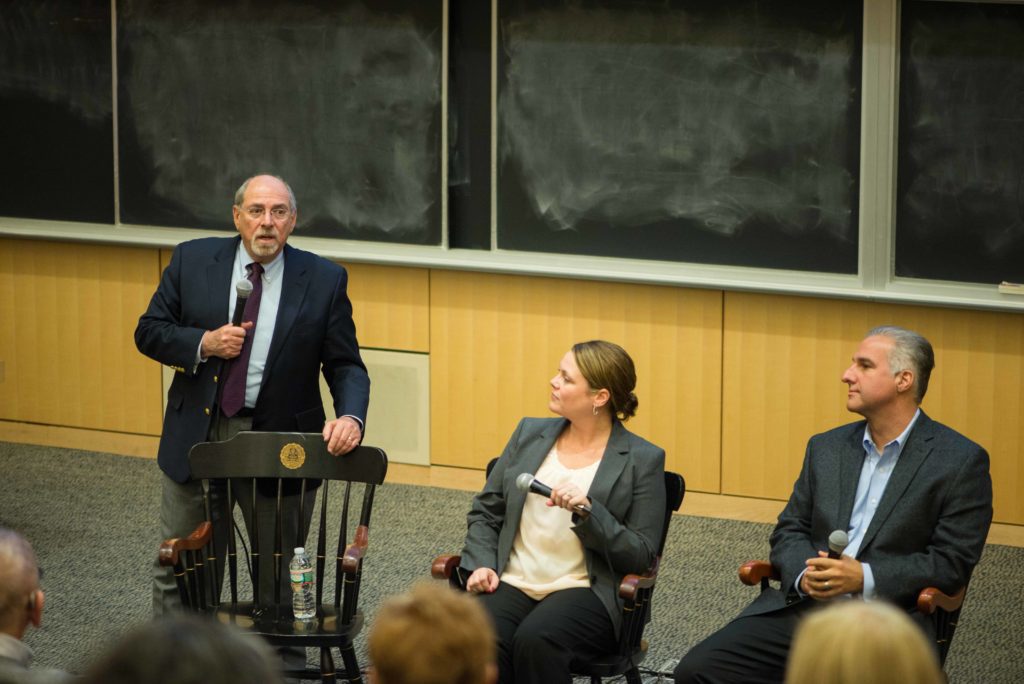Op-ed: I stand with Barry Bluestone
Barry Bluestone speaks at a 2015 event about bringing the Olympics to Boston. / File photo by Scotty Schenck
February 19, 2018
I stand with Barry. After reading The Huntington News account, published on Feb. 15, of Professor Barry Bluestone’s recent comments pertaining to the sitting president of the United States of America, I fail to see why this warrants any institutional response and, thus, any coverage at all. It is, in the end, much ado but not much at all.
His utterance in a public context was possibly ill advised, yet Bluestone himself admits this with the suggestion that he wishes he could have a redo to change just one word in his declaration. “Dead” is certainly a particular (extreme) form of “disappeared,” which is what he says he meant by his words. But the actual statement at issue — “I wouldn’t mind seeing him dead” — is nothing to raise an eyebrow at, let alone weigh in on with such vigor.
There seem to be insinuations that Bluestone was advocating some sort of violence against the president, but there is absolutely nothing of the sort in his words. There are two key elements that defy this interpretation; first, Bluestone’s declaration carries no risk, threat or clear intentionality. He is merely musing out loud and in public from a distance. I’ve heard much worse in many other public settings. But, more to the point, the statement conveys no violence whatsoever. The president’s demise could hypothetically come from a heart attack, a stroke or a particularly severe case of hemorrhoids.
The statement could also be taken metaphorically, as in the president being “dead to me” and, thus, of no further consequence in this world. Or, in failing and ultimately being shamed from office — an outcome that tens of millions of Americans do indeed hope for — the president’s career and other social privileges would cease to exist; in essence, he would be “dead” professionally.
It strikes me as entirely disingenuous for students or others to take Bluestone to task in such a manner when movies, literature and other cultural forms of expression — all protected under First Amendment rights — have, in sometimes enthralling detail, portrayed the myriad ways in which political leaders and presidents might meet their demise. These creative voices, with the added impact of images and sensation, are oftentimes heralded for their fictional representations of the death of a president, yet Bluestone is being pilloried for articulating a view that is fully within his rights to freedom of speech. So when Aubrey Kenderdine advocates the firing of Bluestone due simply to the potential for “negative press” for the university, I am frankly appalled. This might be a good time for Kenderdine to reexamine those political science notes, especially the section on the history of unwarranted and unethical blacklists.
Professor Bluestone’s quiet utterance is ultimately indicative of a voice of frustration and genuine concern about how the country is being led by a man who by all measures is fundamentally ill-prepared, if not mentally unfit, for such office. And if they can come after Barry Bluestone, a man of proven integrity involving life-long public service and stellar scholarship, for stating his thoughts and feelings in such a calm and peaceful demeanor, then anyone who has ever wished the president gone should be wary. This is how the danger happens.
Murray Forman is a media and screen studies professor at Northeastern University’s College of Arts, Media and Design.


















